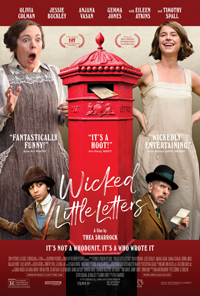Lately I despaired of seeing anything at the theatre that’s worth the female audience’s time.  There are a surprising number of horror films currently playing—someone should remind Hollywood that Halloween is still six months away. And a not insignificant number of movies are just the latest installment of popular franchises (e.g. Kung Fu Panda 4, Ghostbusters: Frozen Empire, the fifth installment). Fresh and female viewer-oriented picks are light on the ground this spring. Then I discovered Wicked Little Letters would be released this month, an R-rated comedy that combines two of my passions: women’s history and justice. I wasn’t disappointed, and I even learned a thing or two. If you’re looking for something to watch at the theatre with your girlfriends, this is your best bet this month. But brace yourself, this one’s wicked fun.
There are a surprising number of horror films currently playing—someone should remind Hollywood that Halloween is still six months away. And a not insignificant number of movies are just the latest installment of popular franchises (e.g. Kung Fu Panda 4, Ghostbusters: Frozen Empire, the fifth installment). Fresh and female viewer-oriented picks are light on the ground this spring. Then I discovered Wicked Little Letters would be released this month, an R-rated comedy that combines two of my passions: women’s history and justice. I wasn’t disappointed, and I even learned a thing or two. If you’re looking for something to watch at the theatre with your girlfriends, this is your best bet this month. But brace yourself, this one’s wicked fun.
Wicked Little Letters is based on the true story of a fabricated harassment campaign. Set in a coastal English town called Littlehampton in the early 1920s, it is the story of an anonymous writer of obscene letters, the woman accused of being their author and the policewoman who solves the poison-pen mystery to prevent an innocent woman from being imprisoned for criminal libel. In a nutshell, it is a story about rectifying a miscarriage of justice. Better still, it’s wickedly funny.
The story follows Irish migrant and foulmouthed single mother Rose Gooding (played by Jessie Buckley) as she is accused, briefly incarcerated and tried as the author of the “wicked” letters, while simultaneously following two other women: pious spinster Edith Swan (Olivia Coleman) and the gifted policewoman dismissed by her incompetent male peers, Gladys Moss (Anjana Vasan). Edith is bullied by her father (Timothy Spall) to her breaking point, and Gladys, who suspects the unfairly accused Rose isn’t guilty, investigates on her own, unsupported by her male colleagues, until she discovers Edith is the culprit and gets incontrovertible proof.
Female viewers will likely enjoy and appreciate Wicked Little Letters more than men, for several reasons—in spite of the fact that the screenplay was written by a man: 39-year-old Jonny Sweet. Most significantly, the lead characters are women: Rose, Edith and Gladys. Also because women are shown working together (Gladys enlists the help of three other townswomen to keep an innocent woman out of jail). And a controlling, overbearing father is portrayed unfavourably. The film also shines a spotlight on sexism throughout, in the home as well as in the workplace.
It has other things to offer the female audience, like a loving, affectionate mother-daughter relationship and an independent, assertive and self-confident single mother doing what she can to give her daughter a good life. The female characters speak to each other throughout—not always wickedly—and there’s congeniality and solidarity between them (including intergenerational). At the end, the women pitted against each other even share a laugh, and the wronged woman receives an apology. This is also one of the exceptionally few movies that mentions the suffrage movement and the women who got us the vote—not a trifling matter, but one for which mainstream filmmakers have demonstrated a limited interest.
Besides having a good number of women in front of the camera, women worked behind it. The film was directed by Thea Sharrock, edited by Melanie Oliver and cast by Jina Jay. As just a few examples, production and costume design, set decoration and music were headed by women. The script supervisor, too, was a woman.
It’s worth mentioning all these female-oriented inclusions because they are still unfortunately too rare in film—despite being appreciated by the female audience.
So even though, as its trailer hints, Wicked Little Letters is full of profanity—mainly disparaging women—and pits the two lead females against each other, this comedy offsets these drawbacks and scores well.
The screenplay produced by Film4, Blueprint Pictures, South of the River Pictures and People Person Pictures also imparts some history lessons. For instance, who knew that at one time policewomen weren’t allowed to marry or have children? I had never heard of the Littlehampton scandal before, but my interest is certainly piqued now.
Although I’m not a fan of coarse language in film, Rose’s forthrightness and refusal to accept other people’s objectionable behaviour was so refreshing that I’m returning to the theatre this week to see Wicked Little Letters again—with my women’s film club this time. We’ll brace ourselves for a wicked little time.
Wicked Little Letters is rated R and has a running time of 100 minutes. It was released on April 5.
 Alline Cormier
Alline Cormier
Film analyst
See all articles by Alline Cormier



